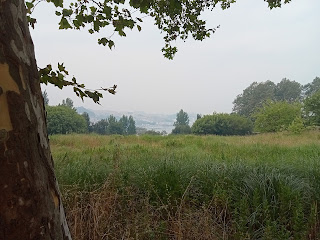The other day I was calling out the latest American Empire colour revolution on social media. It doesn't matter which one it was because I've counted another 2 or 3 more since I posted it. Anyway, some big-gob/bot/whatever (unknown to me but apparently a follower of other people I know), barged onto my time-line to accuse me of being a 'Stalinoid'. Hard to think of a more adolescently feeble 'insult', but it reminded me that while back I wrote a two-part piece about Stalin for my 'Dyer & Mahfouz' Collection. So this is a good excuse to roll it out:
The Birth of Stalin
Gerard Trehy had been an active shop steward in
the building trade in the 1960s. He’d stood against old style bosses alongside
the legendary firebrand Union man, ‘Red’ Eric Heffer. So, when I began work, my
very first job, and almost immediately got ‘volunteered’/put myself forward to
be a shop steward, I asked for his advice. He said: “the thing to watch out for is
at some future union meeting or stewards committee, the top table will report
that the employers have proposed some terrible change to working conditions or
pay or holidays, whatever. And the bloke beside you will lean over and say –
here, that’s outrageous, we can’t let them get away with that. Etc. etc. and
he’ll get you wound up and feed you ammunition, make you angry to such a point that
you will stand up and make an impassioned speech about how the union needs to
stand and fight. And you will pull everyone else up to that pitch and the top
table will agree to confront the bosses and you’ll be volunteered to be at the
forefront because you are so passionate. And later when things get difficult,
the bloke who sat next to you won’t be anywhere to be seen.”
And true enough, in only my second or third
stewards meeting, the branch secretary reported an outrageous stunt from the
bosses, and I leant over to the steward sitting next to me and said: “Here, we
can’t let them get away with that. That’s fucking outrageous.”
The Triumph of Stalin
In the spring of this dissymmetry, singular and true, I am Stalin qua Stalin, to
the big picture, shaping the new individual, indexed to the double scission,
fifth of five but with renewed undeniable music; I am remembered,
fond of binary meets, the very Idea secretary of all meets and all joins
the
warmth, the warmth in that household to preserve
an
infinitely expanding tautology of action, singular and true, A
determination unsympathetic and dismissive assertions,
appropriations under-specified and my model axiom:
“Never ask, command.”
and
by all accounts
I won, to be fair.








